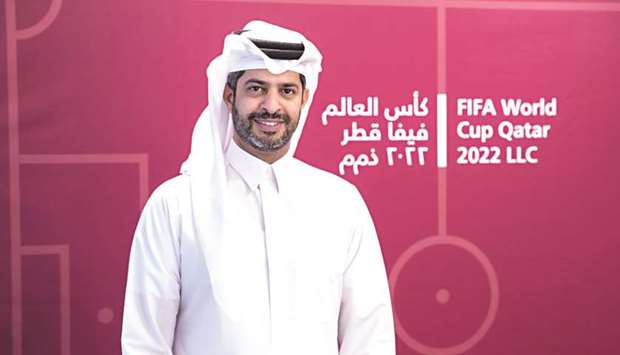A new public transport system consisting of buses using the most sustainable fuel as well as electric power will be introduced before the FIFA World Cup Qatar 2022, noted a top official of the tournament. “Since transportation is one of the major sources of carbon emission in any mega event, the proposed public transport system will use the most sustainable fuel or the green diesel while 30% use electric power,” explained, Nasser al-Khater, CEO, FIFA World Cup Qatar 2022.
He was speaking at a webinar yesterday organised by Qatar Green Building Council (QGBC), part of Qatar Foundation on sustainability as QGBC is marking Qatar Sustainability Week 2020 until November 7.
Al-Khater said that Doha Metro will be the main transportation provider for the fans during the World Cup.
“We expect over 1.5mn fans to visit Qatar during the World Cup. Doha Metro which has been delivered and fully operational, will be the main mode of transportation during the World Cup for all the fans,” he noted.
The official said that sustainability is at the core of the planning of the FIFA World Cup Qatar 2022 since the very beginning.
“We have really focused on sustainability in terms of our constructions. We have adopted the highest standards available in Qatar in terms of sustainable building through the GSAS (Global Sustainability Assessment System) standards. Our stadiums are four or five star rated in GSAS standards. We have strived from the very beginning in 2010 to achieve one core objective of sustainability in all areas,” explained, al-Khater.
He pointed out that as the tournament is just two years away, the approach is now focused on making the operational part more sustainable. “We have done great work to improve the livelihood of the workers and the World Cup has been a catalyst in improving the lives of the workers as we have worked with Josoor Institute to build human capital,” he said.
“We have collaborated with Qatar Petroleum and Kahramaa for the creation of solar power generation plants which will be providing up to 800mw by 2022. We hope and work for a carbon neutral World Cup and we are sure that we will be achieving a very sustainable one and most likely the most sustainable World Cup so far,” he highlighted.
The official maintained that the cooling technology of the stadiums also has a sustainability element to it. “The stadiums will be used all seasons and most part of the technology will run on solar power,” he maintained.
Al-Khater noted that there is already a sustainable procurement methodology for the World Cup and all the vendors will be providing the services adhering to certain environmental standards.
“In the next two years, environmental waste management is an area we are focusing especially on our official sites. We are also working with our stakeholders on better waste management plans. We want to make the World Cup as a catalyst to take waste management to the next level in Qatar,” al-Khater added.
Al-Khater said that Doha Metro will be the main transportation provider for the fans during the World Cup.
“We expect over 1.5mn fans to visit Qatar during the World Cup. Doha Metro which has been delivered and fully operational, will be the main mode of transportation during the World Cup for all the fans,” he noted.
The official said that sustainability is at the core of the planning of the FIFA World Cup Qatar 2022 since the very beginning.
“We have really focused on sustainability in terms of our constructions. We have adopted the highest standards available in Qatar in terms of sustainable building through the GSAS (Global Sustainability Assessment System) standards. Our stadiums are four or five star rated in GSAS standards. We have strived from the very beginning in 2010 to achieve one core objective of sustainability in all areas,” explained, al-Khater.
He pointed out that as the tournament is just two years away, the approach is now focused on making the operational part more sustainable. “We have done great work to improve the livelihood of the workers and the World Cup has been a catalyst in improving the lives of the workers as we have worked with Josoor Institute to build human capital,” he said.
“We have collaborated with Qatar Petroleum and Kahramaa for the creation of solar power generation plants which will be providing up to 800mw by 2022. We hope and work for a carbon neutral World Cup and we are sure that we will be achieving a very sustainable one and most likely the most sustainable World Cup so far,” he highlighted.
The official maintained that the cooling technology of the stadiums also has a sustainability element to it. “The stadiums will be used all seasons and most part of the technology will run on solar power,” he maintained.
Al-Khater noted that there is already a sustainable procurement methodology for the World Cup and all the vendors will be providing the services adhering to certain environmental standards.
“In the next two years, environmental waste management is an area we are focusing especially on our official sites. We are also working with our stakeholders on better waste management plans. We want to make the World Cup as a catalyst to take waste management to the next level in Qatar,” al-Khater added.


